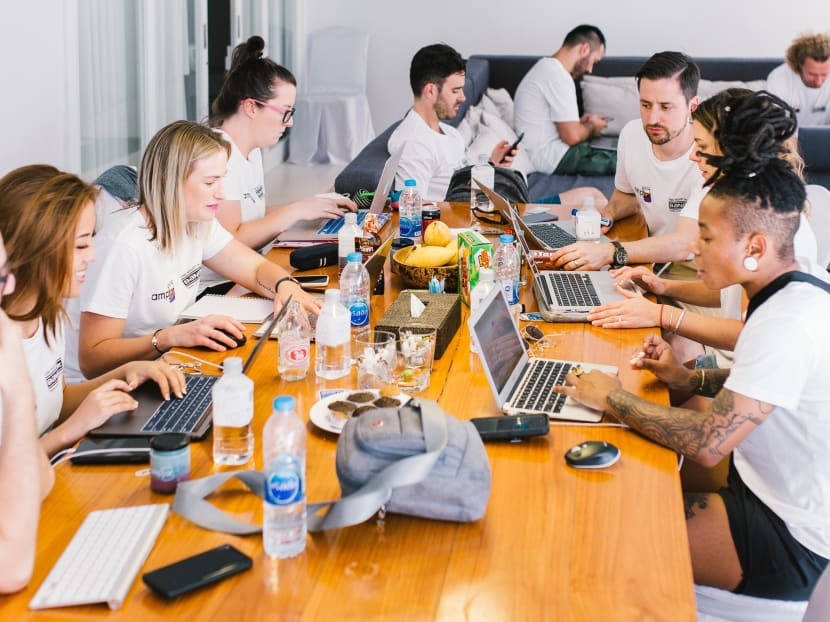Gen Y Speaks: I work remotely. And it has been a blast
I graduated from Yale-NUS College with a liberal arts degree late last year and decided to join start-up Ampjar. But what sets me apart from my friends and ex-schoolmates is that instead of going to work in an office, I work remotely from anywhere in the world.

The author (pictured) says that before she first considered remote working, she had little to no conception of what it means.
I graduated from Yale-NUS College with a liberal arts degree late last year and decided to join start-up Ampjar, giving up a business selling health food which I had started before university.
At Ampjar — an email marketing platform and advertising community — I work in the digital marketing team.
But what sets me apart from my friends and ex-schoolmates is that instead of going to work in an office, I work remotely from anywhere in the world. I am equally happy working from home, a coworking space, or my hotel room.
If I have to sum up remote working in one sentence, it would sound something like this: Happiness meets growth meets self-care.
Before I first even considered remote working, I had little to no conception of what it means. Does it mean you spend all your time on beaches sprawled on daybeds, laptop resting in one hand and iced latte in the other? Does it mean huddling up in co-working spaces anywhere from Bangkok to London?
To anyone feeling “trapped” in a white-lights, dull office environment with a micromanaging boss, working remotely may sound like heaven. It offers freedom from the industrialisation-era 9-to-5 grind.
Indeed, those who speak about the joys of remote work tend to focus too much on where they can work and how they remain productive.
In my nine months of remote work so far, I have discovered that it is a state of mind.
Instead of “clocking in” and assuming that my responsibilities should be fulfilled as an employee for strictly x hours and y days, I now break down my day into small goals .
My friends frequently ask if I’m productive in different environments: My answer is a resounding yes.
While I start the day at 8.30 am on most days, I don’t pay attention to time at all unless I have a call to take (and we keep calls short, sweet, and limited).
I set short-term daily goals that are realistic and achievable, while giving myself sufficient challenge. I am inspired by coaches such as Tim Ferris who believe in working only when you are most effective, so that you are more productive and enjoy life more.
I never feel guilty when I procrastinate because I fully enjoy what I procrastinate on — whether something inane like reading random articles or my vainer pursuits.
I do this knowing that I am no longer bound to any fixed time, and can groove back into my focus zone for another one to two hours and meet my goals for the day.
As long as there is progression in your work in the company and your personal development, you should never feel guilty for “getting distracted” or doing other things while remote working. Distraction is normal and can keep you refreshed. Regular breaks can be perfectly healthy.
Unlike my friends who work in a regular office, I don’t need to dress up for work or feel pressurised to wear makeup. That saves me up to 30 minutes a day. With no need to commute, I save another hour.
That’s more than seven hours of time saved in a week. Moreover, I don’t have to feel that I need to “show face” and get stuff done just because my colleagues are around.
Does not meeting your colleagues in person makes it difficult to work together? Not for me.

I did not meet my colleagues for nine months, but we constantly communicate, if not overcommunicate, with each other through Slack and phone calls.
I also catch up with the chief executive regularly via Slack and Zoom to update him on my work progress and to discuss areas of improvement. I chat with the marketing and customer success team, developers, and designer on a regular basis.
The Ampjar team has grown to 13 individuals, spread across countries as diverse as Australia, the Philippines, Egypt, China, Belarus, the United States and Serbia. Everyone works remotely.
Because of the differences in timezone, we cover all 24 hours of the day. Due to the 100-per-cent-remote nature of the team, the work culture is flexible. Being remote attracts a certain type of person who is active, interesting, motivated, and global.
In late September, our team met in Thailand for a team retreat, lasting a week. It was an amazing experience discovering the strength of our diversity.
We had brainstorming sessions on our product and bonded over fun activities like outings at the night market and visiting an elephant conservation area. The retreat brought our team closer together — in a way that online communication couldn’t.
To be sure, many firms now offer remote work opportunities. Major tech companies like GitHub, Buffer and Zapier are taking the lead in this, and with co-working spaces becoming increasingly common in the last few years, work culture is slowly shifting to encourage greater flexibility.
With digital-first jobs that don’t require in-person meetings, we no longer have to be bound to the work culture that has dominated in the last century.
Of course, roles that are tied to certain geography (like a certain city) or require lots of face-to-face contact, such as events planning or sales, may be unsuitable for a 100-per-cent- remote setting.
Also, remote work arrangements function best if most, if not all, employees do so. Otherwise, it could breed discontent if employees start comparing.
Remote work is for self-starters, the sort who will create new projects and meaningful tasks even if their manager is away. If you’re already struggling to stay productive in a non-remote setting, you’d likely not be able to handle the freedom.
If you cannot focus on your goals without time pressure and struggle with setting your own deadlines, remote work is not for you.
As for me, I’m confident I will thrive by working remotely for some time to come.
ABOUT THE AUTHOR:
Roslyn Teng founded the homegrown health food brand Made Real at the age of 19. She is now a digital marketer at Ampjar, an email marketing platform and advertising community.









